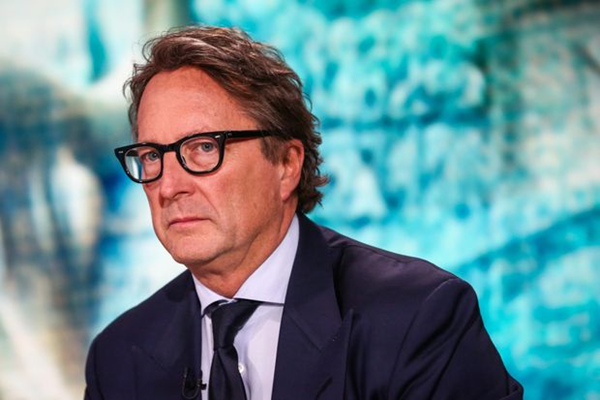
MARKETS
Philip Falcone’s Second Act in Long-Term-Care Insurance Turns Ugly
Former hedge-fund manager is involved in legal dispute with an
ex-regulator he hired to run one of his insurance companies
|

Philip Falcone started his long-term-care plan in 2015.
PHOTO: CHRISTOPHER GOODNEY/BLOOMBERG NEWS |
By
Leslie Scism
March 2, 2021 7:00 am ET
Long-term care has been a troubled insurance product for well over a
decade, causing financial pain to many insurers and their customers.
Now, one executive’s plan to make money where others have failed has
backfired.
Serious pricing mistakes loomed from the start. For policyholders,
this has meant double- and even triple-digit premium-rate increases
over the years. Insurers have collectively taken tens of billions of
dollars of charges against earnings as they bolstered their reserves.
The difficult situation in long-term care provided an opening five
years ago for Philip Falcone, a former hedge-fund manager looking for
redemption. Mr. Falcone had admitted wrongdoing in 2013 for borrowing
$113 million from his hedge fund to pay his taxes, even as
investors weren’t allowed to withdraw their money. He agreed to an $18
million civil settlement with the Securities and Exchange Commission
that included a five-year ban from the securities industry.
In 2015, Mr. Falcone started his long-term-care plan.
Over the next couple of years, the diversified conglomerate he was
running obtained regulatory approvals to acquire two small insurance
carriers that were no longer selling the insurance but had policies
being wound down. Tied to the acquisitions, insurance departments in
at least three states—Florida, Ohio and South Carolina—restricted Mr.
Falcone from involvement in day-to-day operations.
Today, Mr. Falcone has left the conglomerate. A former regulator he
hired to run the conglomerate’s insurance operation was fired and has
filed a federal whistleblower complaint against the company. And the
conglomerate is in talks to sell the insurance operation, known as
Continental Insurance Group Ltd.
Mr. Falcone declined to comment for this article.
State regulators, meanwhile, are still trying to figure out how to
stabilize the struggling long-term-care insurance industry.
Mr. Falcone, then chairman and chief executive of HC2 Holdings Inc.,
was well known when he entered the long-term-care insurance industry.
A Harvard University ice-hockey standout from Minnesota, he had shot
from relative obscurity running Harbinger Capital Partners to riches
and stardom after successful bets in 2007 against the U.S. housing
market.
In turning to insurance in the wake of the SEC settlement, he aimed to
turn the newly acquired carriers into a cost-efficient platform for
acquiring additional closed blocks of long-term-care policies to run
off. Along the way, HC2 would earn investment-management fees for the
conglomerate, he told HC2 shareholders.
Mr. Falcone hired James Corcoran, New York state’s top insurance
regulator in the 1980s, to run Continental.
Over time, Mr. Corcoran became concerned by what he described in a
2019 memo to the insurer’s independent board members as Mr. Falcone’s
“continuing interjections into [Continental’s] day-to-day
transactions, affairs and operations that include what look like
threats and intimidation” in regards to investments. He wrote that
those actions possibly violated the conditions put on Mr. Falcone in
the insurance-department deal approvals.
Some of Mr. Corcoran’s concerns are laid out in the publicly available
whistleblower complaint. Additional detail is contained in a lawsuit
filed in a Texas state court last May by Continental against Mr.
Corcoran accusing him of breach of contract and other
employment-related wrongdoing. Mr. Corcoran says in his legal response
that the lawsuit is frivolous and was filed in retaliation for his
whistleblowing about Mr. Falcone.
Continental withdrew the suit late last year. By then, Mr. Falcone had
left HC2, as activist shareholders pressured the conglomerate over its
flagging share price, and the conglomerate had new management.
Specifically, in the legal filings, Mr. Corcoran said Mr. Falcone
pushed Continental to invest in HC2 affiliates as well as make at
least two other specific investments. One of those took the form of
more than $10 million in loans to an upstart gem and jewelry business
named Arcot Finance LLC. Continental’s regulatory filings for 2019
indicated the investment had lost money.
According to a letter in the court filings quoting an HC2 lawyer, Mr.
Falcone believed he was providing useful investment advice based on
his experience and knowledge, and was acting within regulatory
boundaries.
In an interview, Mr. Corcoran says he spoke up about Mr. Falcone’s
actions “to protect the insurance company and its policyholders.”
The investments at issue represent a small slice of Continental’s $4.4
billion portfolio. In general, state insurance departments permit
small quantities of affiliated investments provided terms are fair to
the insurer.
Mr. Corcoran, along with an independent Continental director, raised
concerns about Mr. Falcone to the Texas Department of Insurance in
2019. In early 2020, the department was examining the insurer’s
related-party activities, affiliated agreements, investments and
corporate governance, according to Continental’s regulatory filings.
A spokesman for the department said it couldn’t comment because of
confidentiality laws.
In a letter to shareholders before his June 2020 departure, Mr.
Falcone wrote that “recent regulatory headwinds have made it
increasingly difficult for the insurance business to meet [HC2’s]
return hurdles, so we have decided to pursue its sale.”
Last spring, businessman Avram Glazer became HC2’s new chairman. In
December, HC2 said it was in deal talks with an entity controlled by
Michael Gorzynski, an HC2 director who led the activism against the
company and joined its board. Mr. Gorzynski subsequently was named
Continental’s executive chairman.
In a Feb. 12 emailed comment, Mr. Gorzynski declined to comment on the
deal talks, but said a new leadership team at the insurer is
“addressing legacy issues head-on,” including reducing exposure to
affiliated investments. It has hired an unaffiliated investment
manager for a portion of the portfolio.
Write to Leslie
Scism at leslie.scism@wsj.com
Corrections & Amplifications
HC2 Holdings Inc.’s insurance unit invested in gem and jewelry company
Arcot Finance LLC. An earlier version of this article misspelled the
company’s name as Arcot Financing. (Corrected on March 2)
